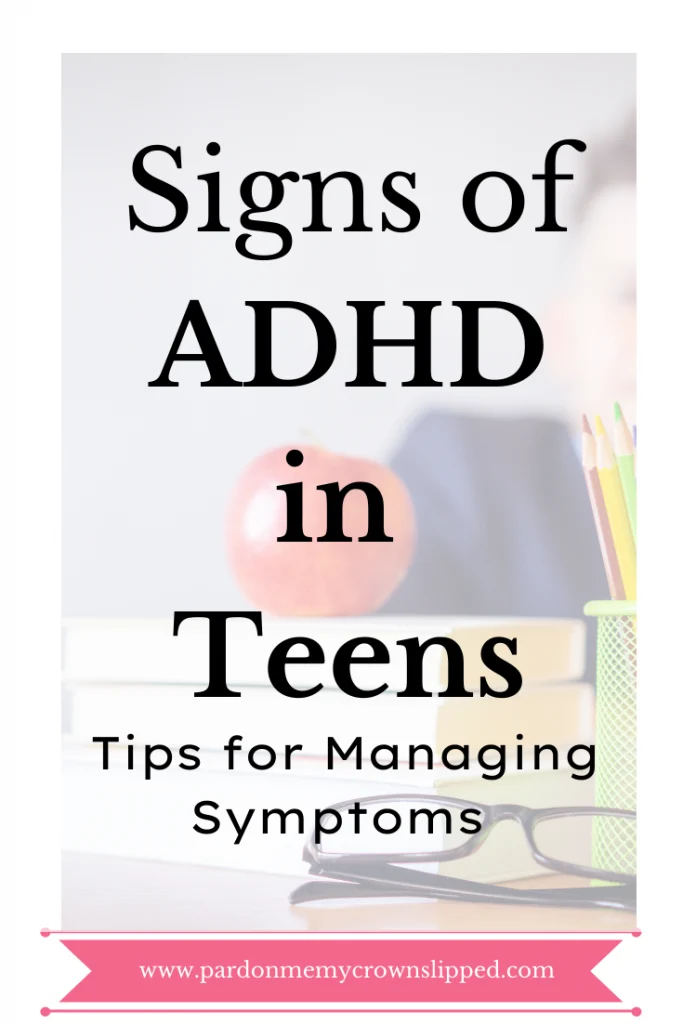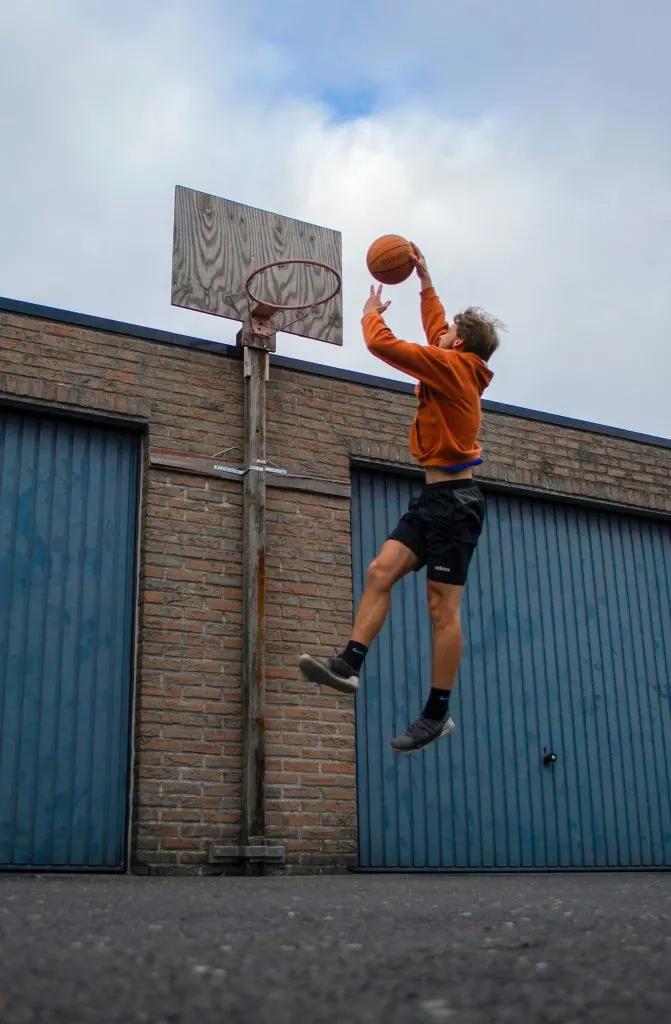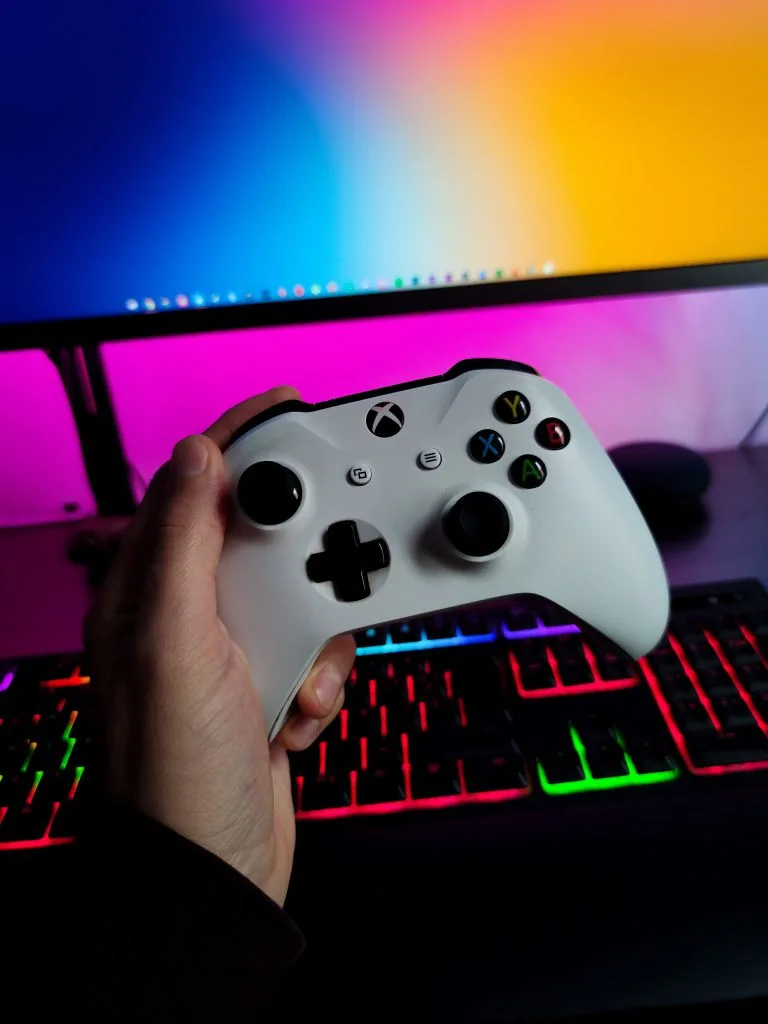Photo by Naassom Azevedo on Unsplash
If you are a parent of a teenager, there is a good chance you have wondered whether or not they may have attention deficit hyperactivity disorder, often referred to as ADHD.
After all, it is a pretty common condition, affecting millions of kids across the United States.
The U.S. has the highest rate of diagnosed ADHD at 11% compared to a rate of around 5% in countries such as Brazil, China, and Europe. The number is even higher among teenage boys, with figures as high as 20%, according to a 2016 CDC’s report.
The study may cause the belief that American culture is the cause, however, more than likely differences in medical opinions in other countries affects the number of children diagnosed.
And, while symptoms of ADHD may vary from person to person, there are some pretty tell-tale signs of ADHD in teenagers.
The typical hallmark signs such as hyperactivity and difficulty completing schoolwork may show up easily in young children but are not always obvious in teens. Because of this parents often miss the signs of ADHD in teenagers.
There are three types of ADHD, some young people only have ADD (Attention Deficit Disorder), without the hyperactivity indicator. Some are predominantly hyperactive but don’t have the inattention issue. Still, others are a combination of both.
All types can continue on into adulthood. Unfortunately, sometimes this continues without a proper diagnosis.
The downside of this can be poor coping skills that result in low self-esteem, drug use, or other risk factors when dealing with symptoms that they don’t know how to navigate.
Girls in particular, though not exclusively tend to have less hyperactive symptoms.
Usually, by the teenage years, most kids learn to manage the hyperactive component. Behavior from younger years just gets chalked up to “they were just being a kid” when I was a kid, which could be the case.
But unfortunately for some kids, this further leads to not realizing the impact of the other symptoms continuing to create challenges for teens.
In speaking with other moms, the awareness of ADHD in their children became much more obvious in their teen years when they began encountering additional pressures of a heavier academic load in high school, first-time jobs, as well as becoming new drivers.
If you think your child may have ADHD, it is important to talk to them and their family doctor.
There is no one-size-fits-all answer when it comes to effective treatment for ADHD, but there are a variety of options that may help manage the severity of symptoms. With the right support, teenagers with ADHD can lead happy and successful lives.

This post contains affiliate links. I will earn a commission at no additional charge to you if you make a purchase using my links. Click here to see my full disclosure policy.
I am in no way a medical professional. The information provided here is simply to suggest and encourage you to seek out a consultation with your child’s doctor.
There are very specific guidelines that medical professionals look at to determine a diagnosis.
The American Academy of Pediatrics (AAP) published a clinical practice guideline that provides recommendations for the diagnosis and treatment of children with attention-deficit/hyperactivity disorder (ADHD).
This guideline is based on the best available evidence and is intended for use by primary care providers, such as pediatricians, family physicians, and other healthcare providers.
For informational purposes, let’s explore some of the signs that may indicate ADD or ADHD and prompt you to speak with your teen’s healthcare provider.
Do any of these ADHD symptoms sound like your teenager?
Signs of Inattentive ADHD in Teenagers:

- Doesn’t seem to be listening when spoken to
- Short attention spans when performing tasks, activities, and conversations
- Makes careless mistakes in schoolwork, at work, or with other activities
- Gets sidetracked or loses focus when doing homework or chores
- Doesn’t follow through on instructions or fails to finish tasks or homework. Or completes it but doesn’t turn it in.
- Has difficulty organizing tasks or belongings
- Avoids tasks or work that requires a prolonged period of mental effort such as schoolwork.
- Avoids doing tasks because they’re afraid to fail
- Often loses things like school supplies, clothing or money
- Is often forgetful and/or easily distracted
Signs of Impulsiveness and Symptoms of Hyperactivity in Teenagers:

- Often fidgets with or taps hands or feet, or squirms in seat.
- Often leaves seat in situations when remaining seated is expected.
- Risky behaviors without considering the consequences with home, school, or people. (As teens, typically substance use or sexual activity)
- Often unable to play or take part in leisure activities quietly.
- Is often “on the go” acting as if “driven by a motor”.
- Often talks excessively.
- Often blurts out an answer before a question has been completed.
- Often has trouble waiting their turn.
- Often interrupts or intrudes on others (e.g., butts into conversations or games)
- Problems with calming down, relaxing, or sleeping
It is important to remember that every teenager is different and some of these signs may not apply to your child.
Because symptoms can change over time, the presentation may change over time as well.
Of course, you know your child better than anyone. Still, only a professional can determine if your teenager is struggling with ADD or ADHD.
Not only must a certain number of the above-mentioned signs be present but other conditions also apply such as:
- When did the ADHD signs begin? It would have begun before age 12 years of age
- How long have the symptoms been happening?
- Do the symptoms clearly interfere with functioning at work or school?
- Are they present in two or more settings?
- The symptoms are not better explained by another mental disorder (such as a mood disorder, anxiety disorder, dissociative disorder, or personality disorder). The symptoms do not happen only during the course of schizophrenia or another psychotic disorder.
How to Help Your Teenager Struggling with ADD or ADHD

One of the best ways to help your teen is to be supportive and realize they aren’t doing it on purpose.
I know it’s easier said than done. Oh, believe me, I know!
It can be even harder when other family members don’t create the same challenges so they feel like the odd one out.
Helping everyone in the household understand the situation can go a long way. Importantly, not judging or labeling kids and teens is critical. They are people first, not defined by their (potential) diagnosis.
Headspace, a website, and an app featuring a wide variety of sessions for meditation, focus, sleepcasts, and more is now FREE for teens. Check it out here at headspace.com
Encourage teenagers to share their feelings with you, a trusted adult or friend. Journaling or poetry can offer another outlet for teens who are struggling.
Online support systems for parents and the ADHD teen help too.
ADHD Kids Rock is a blog started by a teenager who has ADHD as a way to support kids and parents by sharing strategies and stories for “living peacefully with ADHD”. He describes ADHD as superpowers people just don’t understand.
ADDitude is an online blog dedicated to people dealing with ADD and ADHD. The site is filled with helpful articles relating to parenting teens with ADHD.
For some teens, a more structured environment than you can provide is the key to their success. To find out more see this ADHD guide from the Army and Navy Academy.
Related Reading:
- 10 Ways How to Help a Teenager with Anxiety Today
- Discipline List of Consequences for Teenagers: Tips for Frustrated Parents
- 5 Shockingly Simple Ways On How To Improve Tween Attitude Right Now
- 5 Easy Relaxation Techniques for Teens and Tweens To Try Today
- Is Your Teenager Getting Enough Sleep? Simple Tips You Need Today
Tips for Helping Teenagers Dealing with Inattentiveness

- Make sure your teenager has a designated study area where they can work without distractions.
- Encourage them to take breaks throughout the day so they don’t become bored or overwhelmed by their work.
- Help your teenager create a routine and stick to it. For example, have them do chores every day after school and always pack their backpack the night before school.
- Encourage them to use a planner or calendar, either on paper or a phone app so that they don’t forget important dates and appointments.
- Encourage them to break down large tasks into smaller ones so that it’s not as overwhelming.
- Set deadlines for assignments and make sure your teenager knows what the consequences will be if they don’t meet them.
- Make sure your teenager is getting enough sleep because lack of sleep can make it harder for them to focus on tasks at hand.
- Reward them for completing assignments on time, such as allowing extra screen time after school hours if they finish all of their homework before dinner.
- Talk to your teenager’s teacher about ways that they can help your child focus in class, such as sitting closer to the front of the room or providing them with a desk that has fewer distractions. (Older kids can be taught to advocate for themselves)
- Break down tasks into smaller steps and make sure your teenager understands each step before moving on to the next one.
- Make sure your teenager understands why it’s important for them to follow directions and what will happen if they don’t. For example, tell them that not following directions can lead to accidents or injury.
- Encourage them to ask questions if they don’t understand something so that they don’t just guess what they’re supposed to do.
- Provide them with clear and concise instructions.
- Make sure they have enough time to complete tasks properly.
- Mindfulness meditation can improve attention, memory, and focus. It can reduce stress too.
- You should also try talking with your teenager about how they feel when trying to do work at home or at school. Some teenagers with ADHD may be afraid of failing and will avoid doing their work because they fear what others might think if they mess up on an assignment.
- If you notice that your teenager is struggling with these issues, talk to them about getting help from a professional therapist who specializes in treating teens and young adults, particularly an ADHD specialist who can guide you through the best ways to help your teenager manage their symptoms.
Difficulty following a conversation
Many teenagers with ADHD have difficulty following conversations. They may not pay attention to what other people are saying, they may jump from topic to topic without realizing it, or they may not understand the point of a conversation.
Tips for dealing with this:
- Encourage your teenager to take part in activities that will help them improve their listening skills, such as playing games like charades or Pictionary.
- Talk about what a conversation is and how it works so that your child knows why people talk to each other in the first place. For example, you can explain that conversations are a way for people to share ideas, learn new things, and make friends.
- Make sure your teenager understands the importance of listening and that it’s just as important as speaking.
- Help them practice active listening skills by having them repeat back what they heard the other person say.
- Encourage them to ask questions if they don’t understand something that was said.
Tips for Helping Teenagers Dealing with Impulsive Behavior and Hyperactivity

- Encourage your teenager to take part in activities that will help them burn off excess energy such as sports or exercise classes at the gym.
- Try to teach them how to pause and think about the consequences of their actions before they do something that might get them into trouble.
- Allow them to take risks within reason to understand the difference between acceptable and dangerous behaviors.
- Encourage them to find constructive ways to release their energy such as writing, painting, or playing an instrument.
- Make sure they get enough sleep every night. A tired teenager is more likely to be impulsive and hyperactive.
- Create a daily routine for them and make sure they stick to it as much as possible
- For some, food can be a trigger.
Defusing Teen Attitudes: The Ultimate Guide
Some children and teenagers with ADHD or ADD struggle with social situations. They may experience:
- Heightened emotionality, being overly sensitive to criticism or compliments, having mood swings, and crying easily.
- Difficulty interacting socially. They may find it difficult to make friends or keep them, and they may feel socially awkward around others.
- Not understanding social cues which can lead to misunderstandings.
- Not wanting to try new things for fear of being ridiculed or feeling like they don’t fit in.
Tips for dealing with social anxiety:
- Encourage your teenager to take part in activities that will help them meet new people, such as extracurricular activities or social clubs.
- Teach your teenager how to give and receive compliments and criticism in a healthy way.
- Teach your teenager how to read social cues and give them tips on how to start conversations with others.
- Help them understand that everyone is different and that’s okay.
- Make sure they know that it’s okay to be themselves and that they shouldn’t try to be someone else just because that person gets more attention from others.
Trouble compromising with others
Many teenagers with ADHD have difficulty compromising with others. They may be very stubborn and unwilling to give in, even if it means that everyone isn’t happy. They may also have a hard time taking other people’s opinions into account.
Tips for dealing with this:
- Teach your teenager the importance of compromise and how it can help to resolve conflicts.
- Help them understand that not everyone needs to agree on everything and that it’s okay for people to have different opinions.
- Encourage them to think about how they would feel if the situation were reversed and ask themselves if it’s fair for the other person to feel that way.
Personal hygiene issues
Many teenagers with ADHD have difficulty taking care of their personal hygiene. They may not shower as often as they should, they may not brush their teeth regularly, or they may not change their clothes often enough.
Tips for dealing with this:
- Talk to your teenager about the importance of good hygiene and make sure they know what is and isn’t acceptable.
- Encourage them to set a regular routine for taking care of their personal hygiene and make sure they stick to it.
- Provide them with reminders if necessary.
- Make sure they have all the supplies they need, such as soap, toothbrush, and deodorant, so that they can take care of themselves.
- If the hygiene issues are severe, you may need to help them take care of their personal hygiene until they can do it on their own.
Mood disorders are common in children and teenagers with ADHD. These mood disorders include depression, anxiety, bipolar disorder (BD), and more.
Anxiety disorders are also common in children and teenagers with ADHD. These anxiety disorders include social anxiety, generalized anxiety disorder (GAD), and more.
Teenagers with ADHD may also have Oppositional Defiant Disorder or ODD. This is when a teenager acts out against authority figures, including their parents and teachers.
Symptoms of Oppositional Defiant Disorder:
- Arguing or defying requests from adults (e.g., refusing to do chores).
- Refusing to listen when spoken to by an adult.
- Disobeying rules on purpose, even though they know what will happen if they do so (e.g., throwing tantrums when told no).
- Acting in a spiteful way towards others, such as lying or hitting siblings just because it makes them mad at their parents for punishing them earlier.
A Few Thoughts on ADHD and Video Games

Video games and the link to ADHD. Video games are constantly under fire for the effects they have on people of all ages, but particularly children. After multiple studies, there is no evidence that video games cause ADHD.
While kids who have ADHD do seem to play more video games, it does not appear to increase symptoms or severity of symptoms. It seems to be that kids who have ADHD have a high need for stimulation and video games give it to them.
However, it is true that video game addiction is a real thing, in fact, in 2013 Internet gaming disorder (IGD) was included in the Diagnostic and Statistical Manual of Mental Disorders.
Treatment Plan for ADHD
There is a wide range of opinions on appropriate treatment for ADHD symptoms. Among them behavior therapy and stimulant medications.
It really needs to be a personal decision between parents and teenagers. While parents may make the choice for younger children, older teens should be listened to and their thoughts and feelings about the situation considered.
Teenagers are old enough to be educated about and allowed to start making their own choices when it comes to medical decisions.
It is important to remember that diagnosis of ADHD in teenagers is not always easy.
If you feel like your teenager is displaying any of the symptoms mentioned in this post, it’s important to get them evaluated by a professional.
There are many ways that ADHD can be managed and with the help of a specialist, your teenager can learn how to live with their diagnosis and thrive.
For more information on ADHD in teenagers, please visit: https://www.webmd.com/add-adhd/childhood-adhd/adhd-teens
Frequently Asked Questions
Can ADHD be triggered by puberty?
Yes, ADHD can be triggered by puberty. Teenagers with ADHD have trouble focusing and paying attention, which makes it difficult for them to do well in school or at work. They also tend to act impulsively without thinking about the consequences of their actions first.
Biological changes can affect the way their brains react and function making a lack of impulse control even stronger in the face of increasing pressure academically and socially.
These symptoms usually get worse during times of stress or when the teenager is under a lot of pressure.
What are the long-term effects of ADHD?
The long-term effects of ADHD can include problems with relationships, employment, and education. People with ADHD may also have difficulty with substance abuse and mental health issues.
How do I know if my child has ADHD?
There is no one-size-fits-all answer to this question, as each child with ADHD will experience the condition differently. However, there are some general signs and symptoms of ADHD that you can look out for:
- If your child has difficulty paying attention or staying focused on one task for an extended period of time.
- If your child is easily distracted by external stimuli such as noise or people talking nearby.
- If your child has trouble concentrating on one task and tends to jump from one activity to another without completing any of them.
- If your child has trouble controlling their emotions such as anger or frustration, which can result in outbursts of rage and violence towards others (this is especially true if they have combined type ADHD).
- If your child has a hard time coping with stressors like homework assignments due tomorrow or tests coming up soon, which can result in procrastinating or avoiding these tasks altogether, they may have ADHD.
- If your child is more hyperactive than usual and can’t sit still for more than a few minutes.
- If your child has problems with organization, such as being unable to keep their room clean or forgetting where they put their belongings.
- If your child has problems with impulse control and tends to act without thinking about the consequences of their actions first.



